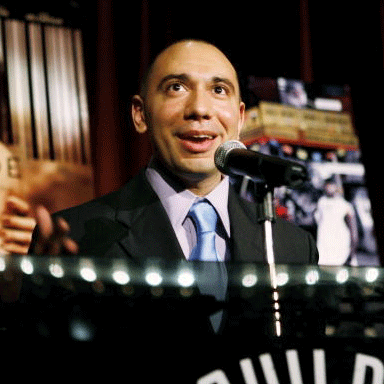If you’re happy Latino actors have finally broken out of the maid and gangster stereotypes, then, sure, thank Diego Luna, Oscar Isaac and Robert Rodriguez … but don’t forget about one unassuming guy from New York City’s Amsterdam Houses: Calixto Chinchilla.

As low-profile as the brother may be (his typical morning: throwing on a t-shirt and jeans and hopping on the A train) he’s probably just as responsible as J.Lo for all the Latino film breakthroughs of the last decade. As the founder of the New York International Latino Film Festival (NYLIFF), for a very long stretch he screened some 80 Latino movies each year — from super-underground animation that wouldn’t otherwise be seen elsewhere to big-time premieres like Girlfight and El Cantante.
NYLIFF – was created in 1999 and became a hub for Latino independent film – giving the likes of Victor Rasuk (of Raising Victor Vargas fame) and Michelle Rodriguez their start and hosted the directorial debuts of John Leguizamo and Roselyn Sanchez. After a hiatus the festival is returning. His fest is also committed to showcasing films from countries typically ignored by the festival circuit, including the Dominican Republic, Ecuador and Puerto Rico. Chinchilla—who is of Puerto Rican, Dominican, Greek and Honduran heritage—was determined that repping lots of culturas was a must. And that’s not to mention all of the scholarships and HBO hook-ups Chinchilla and his staff hand out to aspiring Latino filmmakers.
Not bad for a Fashion Institute of Technology dropout with almost no film background. “I got the idea for (the festival) in 1998 really out of frustration, because I felt like there was no space for Latino filmmakers to get shown in New York,” said Chinchilla, who was just 22 at the time and whose only movie chops were as producer of a student short and marketing/programming experience with the Urbanworld film festival.
But as inexperienced as Chinchilla was, he’d hit on a genius idea: Despite New York City being the Mecca and Medina of all things Latin, the only place to see quality Latino-centric movies in the city was…well, nowhere.
Like most underground successes, the fest’s birth took grassroots pow-wow’ing and a lot of hardheadedness. “At the beginning, I just gathered a bunch of friends–literally we were a bunch of nobodies asking, ‘How do we make this happen?’” Chinchilla remarked. The group met for over a year in cafes and apartments trying to win sponsorships and collect funding.
Early on, even prominent Latinos didn’t support his plan. “’What makes you think you can do this?’ was the typical response,” Calixto remembered. “I don’t know if it was just old guard vs. new guard…but a lot of them had an attitude that ‘we tried this before, and it won’t work.'”
Given that other big festivals were all launched by mega-stars with years in the industry, their skepticism wasn’t surprising: Robert Redford started Sundance, the Tribeca Film Festival was Robert De Niro’s brainchild and even the smaller Urbanworld fest was launched by Miramax exec Stacy Spikes.
But Chinchilla was a hustler. With a friend’s HBO contact in hand, his stalking began. “For a while all I did was bug, bug, bug them,” he remembered. Many phone calls and some serious begging later, the network gave him five minutes to pitch his idea. “Somehow I worked up the muster,” he recalled. To his surprise, five minutes later he “left the building with a yes.”
With a $100,000 budget and Leguizamo signed on to premiere King of The Jungle, the NYLIFF became a reality in 2000. Chinchilla was so nervous he didn’t mention it to his family until opening day (this despite still living with his mom!)
Not surprisingly, the festival has become a year-round gig—meaning Chinchilla ditched his ho-hum management consultant job and now works out of fancy digs downtown instead of his mom’s apartment. But don’t expect him to start flashing bling. It’s his humility that’s made him successful: “Regardless of how many celebrities or sponsors you have, if the community isn’t there, it doesn’t work,” he said. “At our screenings, a movie might technically star nobodies and is directed by nobody, but our audience is so hungry to see Latinos represented onscreen. That’s what makes this festival unique—we’re taking ownership of our own images.”
The New York Latino Film Festival returns and runs from October 11th to the 15th, for more information visit: nylatinofilmfestival.com
https://www.youtube.com/watch?v=EBc2jujIZRA
